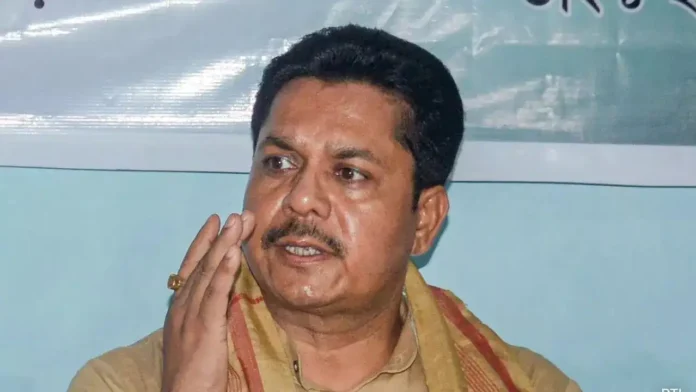Bhupen Borah, the President of the Assam Pradesh Congress Committee (APCC), has vehemently criticized Assam Chief Minister Himanta Biswa Sarma for his recent controversial remark regarding the Congress party’s traditional hand symbol. Sarma, during a public address, had suggested that the Congress should replace its iconic hand symbol with a ‘lungi,’ a reference to the traditional garment worn by many in Assam. Borah’s strong reaction came swiftly, calling the statement offensive and disrespectful to the people of Assam. He questioned Sarma’s intentions and accused him of trying to demean the state’s rich cultural heritage by making such a comment.
The issue has ignited a storm of political debate in the state, with both parties exchanging sharp words. Borah, in his response, did not hold back, accusing Sarma of undermining the dignity of Assamese people by reducing their cultural symbols to mere political tools. He argued that such remarks were an attempt to divert attention from more pressing issues affecting the state, including unemployment, healthcare, and the overall governance of Assam. Borah’s condemnation of Sarma’s statement was not just limited to the remark about the ‘lungi.’ He further intensified his criticism by making a provocative statement, urging the Bharatiya Janata Party (BJP) to adopt ‘Godse’s gun’ as its official symbol.
Borah’s reference to Nathuram Godse, the assassin of Mahatma Gandhi, added another layer of controversy to the already heated political discourse. The remark seemed to draw a parallel between Sarma’s alleged divisive rhetoric and the violent ideologies associated with Godse. Borah’s comment was a direct attack on the BJP’s ideology, suggesting that the party, under its current leadership, was veering toward a dangerous path that valued aggression over peace and unity. The remark has been seen by some as a direct challenge to the BJP’s leadership and the political tactics it employs, particularly in Assam, where the party has enjoyed considerable success in recent years.
The Congress leader’s statement was met with a mix of reactions from both sides of the political spectrum. While some of Borah’s supporters hailed his boldness in calling out the CM’s insensitive comment, others within the Congress camp have urged caution, fearing that such inflammatory remarks could escalate tensions further. Meanwhile, BJP leaders in Assam have dismissed Borah’s accusations, claiming that the Congress leader was merely trying to shift focus away from the real issues plaguing Assam. They argued that Borah’s focus on Sarma’s comment was an attempt to deflect attention from the Congress’s internal struggles and diminishing influence in the state.
Borah’s comments have also sparked a broader discussion about the tone and tenor of political discourse in Assam. Critics argue that personal attacks and inflammatory statements have become too common in recent years, overshadowing meaningful discussions on development, governance, and social issues. In a state that has witnessed considerable political volatility, many are calling for a return to more substantive debates focused on the well-being of the people rather than on sensational remarks that only serve to deepen political divides.
The political fallout from this exchange is likely to continue in the coming days, as both Borah and Sarma are expected to address the media and their respective supporters. The Congress, under Borah’s leadership, will likely continue to challenge the BJP’s policies and governance style, while Sarma and the BJP will seek to defend their stance, highlighting their success in implementing schemes aimed at benefiting the state’s development.
In the midst of the political mudslinging, ordinary citizens of Assam are beginning to voice their concerns about the divisive nature of such rhetoric. Many people in the state are more concerned about economic recovery, job creation, and ensuring better access to healthcare and education than about the political squabbles between their leaders. This ongoing back-and-forth between the Congress and the BJP, while providing ample material for political discourse, may ultimately divert attention from the real issues that need urgent resolution.
As the controversy rages on, the people of Assam will likely continue to closely watch the unfolding political drama. The question remains whether this episode will change the dynamics of the state’s political landscape or if it will simply become another chapter in the long history of political rivalry between the two major parties.


